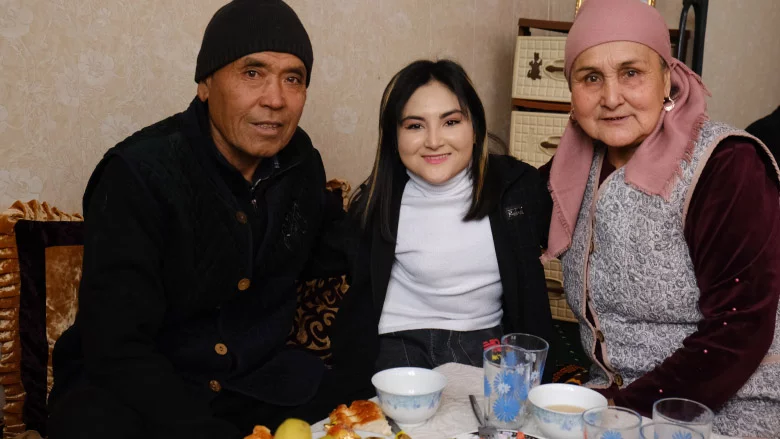Browsing social media one day, Mendayim Suyunbai Kyzy – a then-eighteen-year-old IT student in Osh, Kyrgyz Republic – came across an advertisement about a training for young aspiring entrepreneurs that would profoundly change her life.
“I signed up for training and capacity building courses that gave me new knowledge and skills. I learned how to add value to a product, market and sell it. I also greatly improved my communication skills. I met a lot of motivated peers and learned to convey my thoughts clearly in public,” Mendayim says.
These trainings were transformational for Mendayim. They broadened her horizons and introduced her to ideas about community-driven development, opportunities for women, sustainability, and climate change.
The training Mendayim took was offered as part of the Aga Khan Foundation and the World Bank’s Livelihoods for Youth (L4Y) Community Support Project, supported by the Japan Social Development Fund. This project sought to develop skills and boost the employability of young women and men in communities located along the Central Asia – South Asia – 1000 (CASA-1000) electricity transmission line.
Key results of the L4Y Community Support Project (2019 – 2022)
- More than 1,600 young people received trainings to enhance their technical and vocational skills
- 30 Common Interest Groups (CIGs) have been set up and 618 members of CIGs were trained in agriculture production, processing techniques, marketing, and business management
- Nearly 700 people took part in beginner or advanced entrepreneurship programs
- Over 1,200 enrolled in IT courses
From trainee to businesswoman
Equipped with new skills, Mendayim turned an innovative idea into a successful enterprise using a $3,000 grant from L4Y, launching production of cookies, tea, and cosmetics – all made from rice grown by her parents. The reddish-brown rice Mendayim uses in her products is the main source of income for many farmers in the Uzgen district in the southwest of the Kyrgyz Republic where she comes from.
Today, Mendayim is a proud owner of her Rice Cookies business. “Not only do I work for myself, but I have also employed my mother and my sister – my loved ones. And I would not be mistaken to say this is my biggest achievement. They have always stood by me, and now for their work I pay them back!” Mendayim says.
Using her IT skills, Mendayim is looking to expand her enterprise. “We make sales through social media and messenger apps. Once, we had a customer all the way from the Netherlands! But of course, the main market is two cities – Bishkek and Osh, where we see a growing demand for organic products,” Mendayim explains. “Most importantly, I feel confident now. I am sure that a village girl can achieve great things and live independently with a disability.”
“I feel confident now. I am sure that a village girl can achieve great things and live independently with a disability.”

Mendayim’s parents are proud of their daughter and the steps that she is taking to lead a productive adult life. “We always told our daughter that getting a good education is key for her. She worked very hard, graduated from school with distinctions and entered the university,” Mendayim’s mother, Rahat, emphasises. “When she shared with me her small business idea, I agreed right away to help her make gluten-free rice cookies,” Rahat laughs, recalling that she had never heard of gluten before that conversation. “Mendayim has always been a proactive kid. We think she will become a successful businesswoman,” her father adds with a broad smile.
Support and encouragement of her parents has been essential for Mendaiym’s aspirations. Unlike many girls from remote and often conservative communities, she did not have to struggle with restrictive gender norms and familial expectations when considering pursuing an education and employment opportunities. Mendayim picked what she considered a practical, career-oriented major in college: “The IT sphere is modern, interesting, and gives an equal chance to all. All sorts of jobs will be open for me in IT when I get the necessary skills,” she says.
“The IT sphere is modern, interesting, and gives an equal chance to all. All sorts of jobs will be open for me in IT when I get the necessary skills.”
Empowering women in the Kyrgyz Republic
While Mendayim has found success, many women in the Kyrgyz Republic lack equal or similar opportunities to earn income compared to men. In 2022, labor force participation for women was 44.1 percent compared to 74.5 percent for men, and substantial gender gaps remain in entrepreneurship and wages, with women earning only 75 percent of what men earn. Women in the Kyrgyz Republic face multiple barriers to paid employment and starting businesses, including lack of STEM and other skills in high demand, lack of training and access to credit, legal barriers, expectations to provide unpaid care work and other household responsibilities, in addition to restrictive social norms on women’s roles and value in the workplace.
To tackle these challenges, the L4Y project financed small social and economic infrastructure investments in communities, as well as capacity building and technical support to youth and youth-led enterprises, which are also helping to support economic infrastructure investments under the World Bank-funded CASA-1000 Community Support Project.

Mendayim is just one of 4,000 young women and men who benefited from the L4Y Community Support Project between 2019 and 2022. Her story serves a reminder that creating opportunities for women and marginalised communities – in education, training, and employment, as well as access to social assistance – enables them to reach their full potential. That is essential for driving forward economic growth in the Kyrgyz Republic and beyond.
This article was originally published by the World Bank





